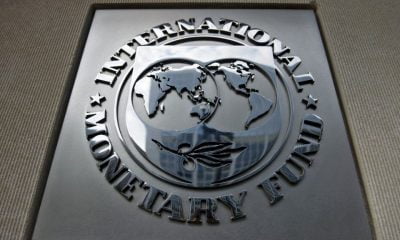Business
IMF Endorses VAT Increase, Gives Reason

A senior resident representative with the International Monetary Fund (IMF) and mission chief for Nigeria, Amine Mati, says an increase in Value-Added Tax is a step in the right direction for Africa’s most populous nation because it will contribute to declining revenue.
Naija News recalls that the Federal Executive Council (FEC) recently approved an increase in VAT to 7.2%
Similarly, the budget 2020 submitted by President Muhammadu Buhari based its revenue projections at 7.5% VAT.
The IMF senior resident representative in a statement released on Wednesday at the end of a visit to Nigeria to update macroeconomic projections and review reform implementation, said there is an urgent need for a comprehensive reform package to reduce vulnerabilities and raise growth.
The statement reads as thus: “The outlook under current policies remains challenging. Growth is expected to pick up to 2.3 percent this year on the strength of a continuing recovery in the oil sector and the regaining of momentum in agriculture following a good harvest,” he said.
“Revenue initiatives planned under the 2020 budget—including a VAT reform that increases the rate, introduces a minimum registration threshold and exempts basic food products—will help partially offset declining oil revenues and the impact of higher minimum wages, thus keeping the overall consolidated fiscal deficit elevated.
“The current account’s shift to a deficit is expected to persist while the pace of capital outflows continues to weigh on international reserves. Inflation will likely pick up in 2020 following rising minimum wages and a higher VAT rate, despite a tight monetary policy.”
Mati expressed concern at CBN’s “increased financing of government” and urged that longer-term government instruments should be introduced to mop up excess liquidity.
“Over-optimistic revenue projections have led to higher financing needs than initially envisaged, resulting in overreliance on expensive borrowing from the CBN to finance the fiscal deficit.
“The increasing CBN financing of the government reinforces the need for an ambitious revenue-based fiscal consolidation that should build on the initiatives laid out in the Strategic Revenue Growth Initiative.
“A tight monetary policy should be maintained through more conventional tools. Managing vulnerabilities arising from large amounts of maturing CBN bills—including those held by non-residents—requires stopping direct central bank interventions, the introduction of longer-term government instruments to mop up excess liquidity and moving towards a uniform market-determined exchange rate.”
The IMF official also called on the CBN to carefully assess its recent directive to banks on increasing loan to deposit ratio to 65% for potential consequences on banks’ asset quality and the inflation target.












